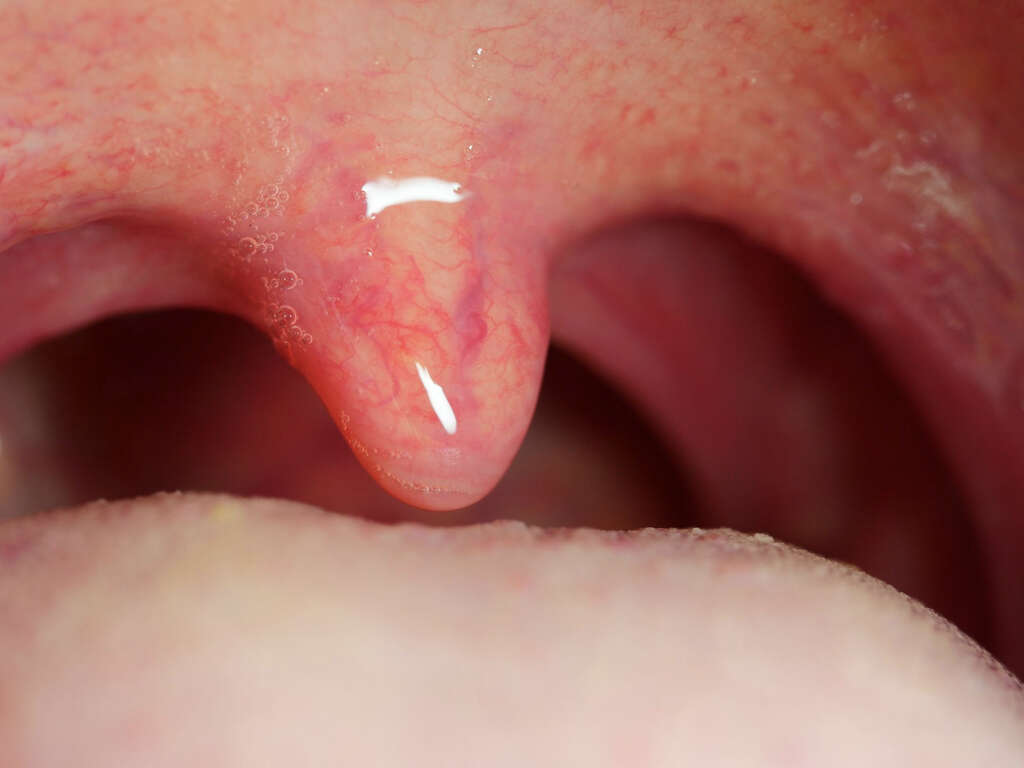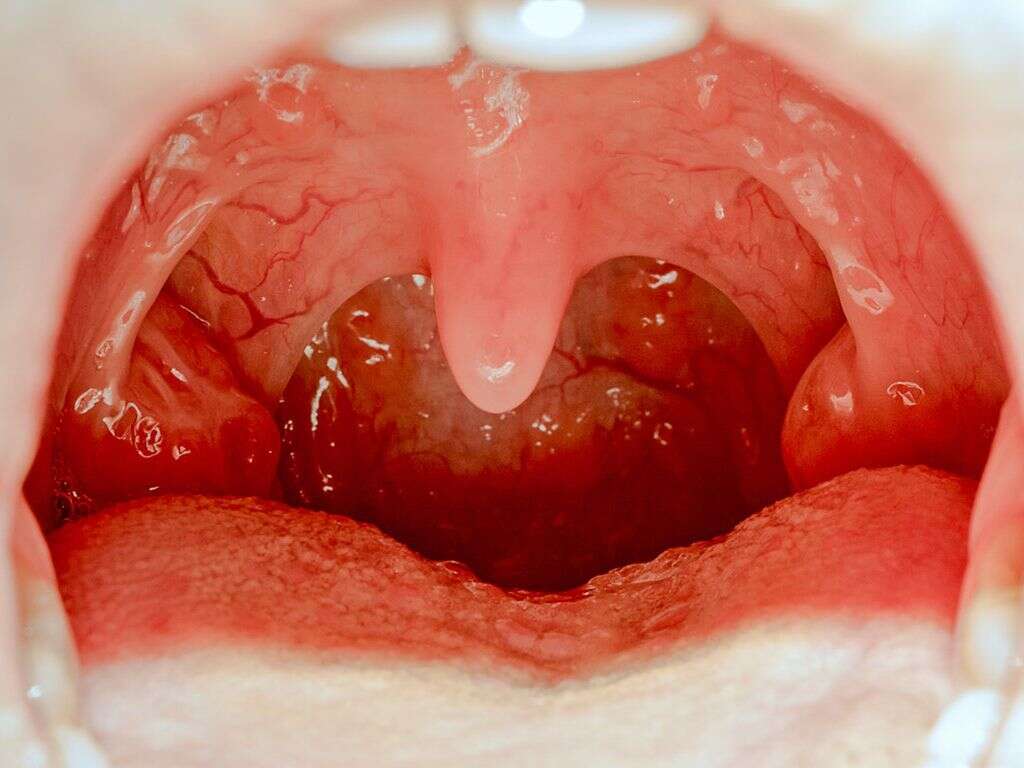Swollen Uvula Causes
Hanging from the roof of your mouth and at the back of your throat, you will see a protrusion of pink-colored tissue in the shape of a drop. This is known as the uvula. The uvula usually ascends with the soft palate to prevent food and liquids from entering the nose while swallowing. It also aids in a person’s speaking ability. Finally, it can also trigger the gag reflex and prevent choking.
When the uvula becomes swollen, it can cause a foreign object sensation in the back of your throat. This condition is called uvulitis. Swelling of the uvula can occur together with swelling of the surrounding tissues such as tonsils and the throat. A person with uvulitis may also have a sore throat and swallowing may become difficult or painful. If you feel like you might have uvulitis, you can check this out by opening your mouth in front of a mirror and saying “ah”. If your uvula is swollen, it will probably be enlarged and the mucosa will exhibit a red color. But what causes it? Here are 10 swollen uvula causes.

1. Gastroesophageal Reflux Disease (GERD)
Almost half of adults in the United States will experience symptoms of gastroesophageal reflux disease (GERD), at least once a month. GERD is a consequence of the backing up of gastric acid (above the normal limit) into the esophagus, which is the tube that connects the mouth with the stomach. This usually happens after a meal, and it causes symptoms with or without damaging the lining of the esophagus. Examples of typical GERD symptoms are heartburn, regurgitation, and difficulty swallowing.
Additionally, the acid from the stomach can flow upwards and reach the throat and the larynx (voice box), causing a subtype of GERD known as laryngopharyngeal reflux (LPR). Common symptoms of this condition include sore throat, hoarseness, cough, and a lump-sensation in the throat. When the uvula comes into contact with acid reflux in LPR, it can become red and swollen. If you have uvulitis, and suspect of acid-reflux as a possible cause, consult with a specialist for proper diagnosis and treatment.

2. Herbal Remedies
For some people “natural” means harmless. However, that is not always the case. For example, some herbal remedies can induce uvulitis. A good example is the Mediterranean plant Ecbalium elaterium, also known as wild or squirting cucumber. It belongs to the Cucurbitaceae family, and its juice has been attributed to anti-inflammatory effects, especially in the management of sinusitis.
However, there are no scientific studies that validate its use for this purpose. In fact, it has been reported to cause swelling of the upper airway in some people, especially affecting the uvula and the soft palate. Similarly, an edible plant known as Brassica arvensis (wild mustard) can also cause uvulitis in some people. Rarely, it is also used as a home remedy.

3. Recent Injury
Because the uvula is located inside the mouth where it is protected by the skull, its injury is not common. Still, it can be injured during intubation, which refers to passing down a tube for general anesthesia, or during removal of the tonsils, also called a tonsillectomy.
Upper endoscopy, which involves inserting a tube through the mouth to study the lining of the upper gastrointestinal tract, can also be another cause of trauma to the uvula. However, the uvula heals spontaneously and quite fast.

4. Intense Snoring
Snoring is a widespread condition in the United States. However, the health implications and the severity of snoring can vary. Snoring sounds are caused by the vibration of the tissues of the airway during sleep. This is a consequence of obstructions to air movement during breathing, which can be produced by many factors including obesity, obstruction in the nasal passageway, genetics, and more.
During snoring, the velocity and the turbulence of the air that passes through the throat increases. If it is a chronic problem, the uvula can be put under stress due to excessive vibration and become swollen. Additionally, people who snore with an open mouth can experience dry mucous membranes, which can also affect the mucosa of the uvula. This can further exacerbate uvular irritation. If you have a snoring problem and constantly experience uvulitis or other symptoms such as sore throat, be sure to visit your healthcare provider for diagnosis and management of the underlying problem.

5. Allergic Angioedema
Angioedema is loosely defined as the swelling of the skin or submucosal tissues due to increased vascular permeability. In short, tiny blood vessels in the skin and mucosa develop an increased capacity to allow the passage of fluids through their walls, causing the swelling of the tissues involved. This process is usually mediated by compounds involved in immune responses such as histamine and/or bradykinin. Acute angioedema usually presents as the swelling of the lip, eyes, and face; nevertheless, it can affect other parts of the body. Specifically, in the mouth, massive tongue and uvular swelling can be common. Furthermore, the involvement of the larynx can be life-threatening because it can impair breathing.
The causes of angioedema can be allergic or hereditary. Common allergic causes include food allergies (i.e. peanuts, shellfish), stinging insects (i.e. bee sting), latex, and antibiotics. If you or a person you know is having a severe allergic reaction, seek emergency medical attention immediately.

6. Bacterial Infection
The most common bacteria that affects the throat is streptococcal bacteria. Specifically, Streptococcus pyogenes causes the inflammation of the pharynx and tonsils, leading to what we know as strep throat. Uvulitis can develop in severe cases of strep throat. If you have tonsillitis, for instance, the back of your throat including the uvula can be swollen because of the infection and inflammation. Sometimes, only one tonsil becomes inflamed along with your uvula. In severe cases, this can lead to deviation of the uvula away from the affected tonsil.
Abscesses in the tonsils or within the tissues that surround them (peritonsillar abscess) can also cause uvulitis. They usually present with a deviated uvula, fever, tonsilitis, sore throat, spasms of the jaw muscles (trismus), and “hot potato” voice. Finally, bacterial infections can cause the inflammation of the epiglottis (epiglottitis), which is the tissue that prevents food from entering the windpipe. Epiglottitis can also present with uvulitis.

7. Viral Infections
Viral infections can affect the uvula, irrespective of whether this affects the whole throat or not. Viral infections can also cause the inflammation of the larynx, pharynx, and/or sinuses. Furthermore, a dangerous cause of uvulitis can be epiglottis. As mentioned before, epiglottitis is the inflammation of the epiglottis.
Importantly, it can also be caused by viruses. Finally, most mild viral infections that affect the upper respiratory tract do not require treatment and clear within 7 to 10 days.

8. Drug-induced Angioedema
As mentioned previously, angioedema is the swelling of the skin or submucosal tissues due to increased vascular permeability. Acute angioedema usually presents as the swelling of the lip, eyes, and face; nevertheless, it can affect other parts of the body. Specifically, in the mouth, massive tongue and uvular swelling can be common.
Common blood pressure medications that can cause angioedema include angiotensin-converting enzyme inhibitors (i.e enalapril) and angiotensin-2 receptor blockers (i.e. losartan). Similarly, painkillers such as nonsteroidal anti-inflammatory drugs, also known as NSAIDs (i.e. ibuprofen), can also cause angioedema.

9. Oral Cancer
Many types of cancer can affect the oropharynx. Squamous cell carcinoma is the most common in this region. Furthermore, it can start in the uvula, but rarely does so. As a consequence of oral cancer, patients can exhibit throat swelling, enlargement of the uvula (i.e. twice the normal size), difficulty to swallow, among other symptoms.
Importantly, a thorough medical history of the patient must be obtained by the physician, to exclude other causes of uvulitis. As with many malignant conditions, the sooner the condition is diagnosed, the better the prognosis.

10. Genetic Causes
Angioedema can also be hereditary. This means that a mutation in a specific gene is inherited from your parents. In this case, the affected gene is responsible for the production of a protein known as a C1 inhibitor (C1-INH). This protein is responsible for keeping in check certain immunological responses. However, if there are low levels of this substance in the body, the immune system can misfire and cause angioedema.
Episodes of hereditary angioedema (HAE) are usually random, but they can also be triggered by specific factors (i.e. medications, stress, infection). Manifestations of this condition include painless swelling of the skin, abdominal pain, and/or involvement of the upper respiratory tract. Hence, HAE can affect the tongue, throat (including the uvula), and/or larynx (voice-box), possibly even causing airway obstruction. Unfortunately, there is no definitive cure for this condition; but, management involves several treatment options for acute attacks and diverse preventive measures to decrease the frequency of episodes.












